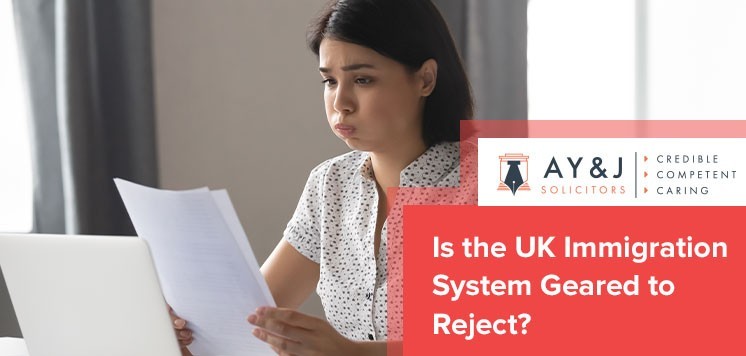Disclaimer: The information in this blog is accurate as of its publication date. Any updates after that date are not reflected here.
On 1st November 2019, the Guardian’s often insightful ‘long read’ made the case that the immigration system in the UK, as it stands, is heavily biased towards hostility and rejection, rather than welcoming and accepting. Unfortunately, this will come as no surprise to many. The Windrush scandal, the cancelling of thousands of study visas following allegations of cheating in relation to the TOIEC English-language skills test, and more recently, the imposition of the settled status system on EU citizens wishing to remain in the UK after Brexit all exemplify this. In this blog, we will review the key points raised by the Guardian long read and assess whether the UK immigration is genuinely geared to reject immigrants.
Table of Contents
Lack of support for asylum seekers and migrants
One of the article’s primary points is that many immigrants are not given the support they need when applying for visas, especially those lacking financial resources. One such individual is Diana, an immigrant from Zimbabwe. Diana, by any definition, is in a vulnerable situation. Having left her home country to come to the UK, she arrived on a visitor visa which she switched to a student visa. Later she married an EU citizen, but then divorced owing to the domestic violence she was subjected to. At this point, in a bid to ensure her own safety and future, she decided to seek UK refugee status. She describes how she was misled and encountered lawyers who did not provide her with correct information and didn’t have the necessary facts of her case when representing her in Court. As a result, she was repeatedly declined for refugee status.
It is certainly true that, given the ever-changing nature of immigration processes and policies, a robust level of knowledge and experience is needed to navigate the maze of forms, rules, and requirements. It is also the case that due to decimation of legal aid, many of the most vulnerable immigrants to the UK have fallen victim to a two-tier system (i.e. those who can afford legal support and those who cannot). This is especially so due to the closure of the Refugee and Migrant Justice (RMJ) and the Immigration Advisory Service several years ago.
It must be said though that most honest and transparent immigration law professionals will take the time to listen to the situations of immigrations struggling with the system and offer the benefit of their advice. While some unscrupulous immigration lawyers exist, most would never dream of taking advantage of or ignoring vulnerable individuals who are simply seeking security for themselves and their children.
Migrants can ensure they are receiving reputable legal advice by instructing a legal professional who is registered with the Solicitors Regulation Authority. Also look for accreditations, such as the Law Society Immigration and Asylum accreditation and check if the law firm is registered with the Immigration Law Practitioners’ Association (ILPA).
Prohibitive immigration fees and expenses
Immigration to the UK is neither free or cheap, and this poses another barrier to entry for those who want to make this country their home. As the Guardian article says, “money lubricates the process”. The application fee for Settlement is currently £1,523, and for a dependent relative, the charge is £3,250. This may be affordable for some, but for others, it is simply out of the question.
Given that immigrants tend to contribute more than they take from the UK (£28,000 per non-EEA national over their lifetime), charging thousands of pounds for an application fee could be viewed as highly questionable. Add to this the cost of simply calling the Home Office to ask a question (£5.48 per minute), and it is hard to counter the argument that poorer migrants are disproportionately unable to get the information they need. Contrast this against the Tier 1 investor visa, which for an investment of £10m, holders can apply to settle in the UK after just two years (or five years for £2m). They are also able to bring family members and can apply to extend for a further two years.
Stripping back migrant rights
The third theme raised by the Guardian long read is that of the gradual removal of migrant rights. Immigrants are routinely sent to reside in far-flung parts of the country, and many are forced to reside in low standard housing. The reasons for the poor standard of housing for asylum seekers is due, to the lack of available funds, but it is also blamed on the contracting out of these services to firms such as G4S. Such are the conditions in some asylum properties, Home Office inspectors have discovered urgent defects in 91% of properties.
Beyond asylum housing, immigration removal centres, such as the well-known Yarlswood immigration centre, are further proof of lack of humanity towards some migrants. The article explains the case of one man, Andy, who was left homeless due to lack of ID resulting from his immigration status. Andy originally came from Ghana with his father and two brothers and two sisters. He was left to fend for his siblings after being deserted by his father and a woman who was looking after the family. When the social services discovered that had happened, his brothers and sisters were placed into care. At the age of 18 and without immigration papers or proper ID, social services would offer him no assistance, leaving him the streets to fend for himself. After later being imprisoned for ID theft, he was then placed in an immigration detention camp where he applied for asylum. The asylum was granted after five long years and multiple rejections, but he is still not allowed to work due to ongoing problems with his ID. While Andy’s situation was somewhat resolved after many years, if one story highlights what can go wrong for innocent and hardworking immigration, this surely does.
Final comments
For matters to improve for migrants coming to the UK, a shift in public perception needs to occur. Firstly, many in society hold the view that vast amounts of immigrants are coming to the UK from other countries, but this is not the case. Indeed, estimates suggest only ~3% of the world’s population are international migrants; most people tend to stay in the same area or move within the same country. International migration is, however, likely to increase due to the rising income gap between richer and poorer nations, and climate change. As the Guardian points, out, immigrants are too often seen as burden or threat, and to add to this, they are often underpaid and overqualified.
Quite whether the UK government will continue to make the process of immigration from other countries as complex, unwelcoming, and expensive as it currently is, remains to be seen. This may depend on the next twist and turn in the fortunes of the UK, including whether Brexit happens, how it transpires if it does, whether there will be a change of Government with a more sympathetic perspective on immigrants and the value they bring this country, economically, culturally and otherwise. Hopefully, we will know more in 12 months, but, then again, we said the same thing last year. Keep watching this space.
A Y & J Solicitors are specialists in immigration law based in central London. If you would like more information regarding refugee law and migration to the UK, please contact us at contact@ayjsolicitors.com or call +44 20 7404 7933.
Disclaimer: No material/information provided on this website should be construed as legal advice. Readers should seek an appropriate professional advice for their immigration matters.









